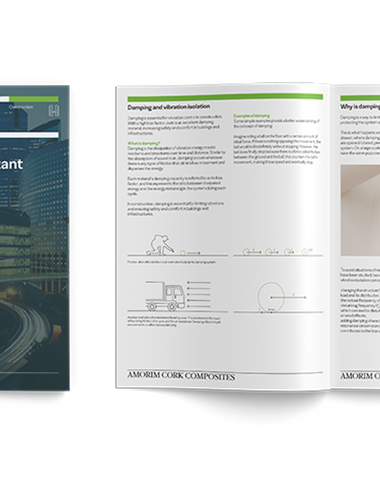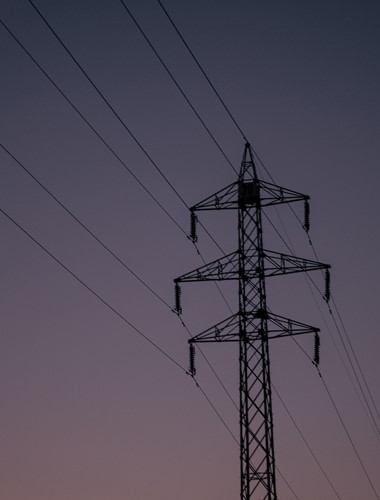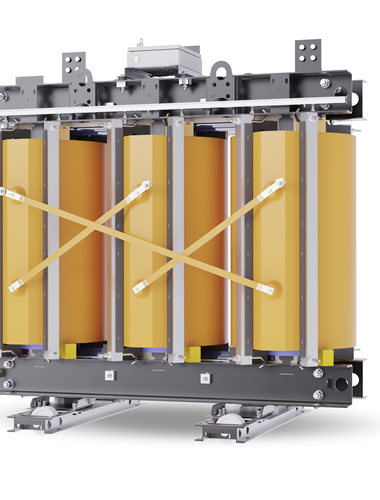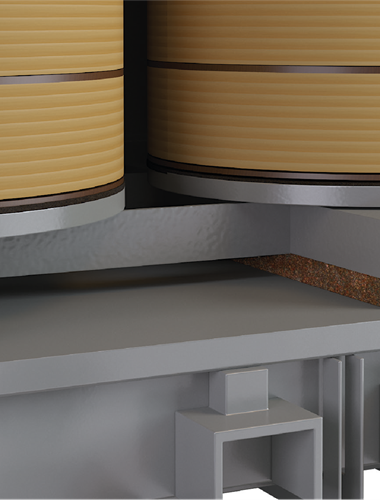30 results found damping

Damping
Damping is the dissipation of energy, usually by releasing it in the form of low-grade heat. The loss factor quantifies the level of damping of a material, it is the ratio of energy dissipated from the system to the energy stored in the system for every cycle. Due to corks closed cell structure filled with air, cork ha…
Damping
The dissipation of vibratory energy in solid structures over time and space. It is analogous to the absorption of sound in air.
Damping
The dissipation of vibratory energy in solid media and structures with time or distance. It is analogous to the absorption of sound in air.
Damping
The dissipation of vibratory energy in solid media and structures with time or distance. It is analogous to the absorption of sound in air.

Why is damping important for construction?
Damping is essential for vibration control in construction. With a high loss factor, cork is an excellent damping tool, boosting security and comfort in buildings and infrastructures.

Why is damping important for construction?
Damping is essential for vibration control in construction. With a high loss factor, cork is an excellent damping tool, boosting security and comfort in buildings and infrastructures.

1. Acoustic insulation and damping
One of the main reasons for choosing an Heavy Mass Layer with cork is its ability to improve the acoustic and damping performance of different vehicles. Cork's closed, air-filled cellular structure allows inherent damping of structural noise transmission, thus improving the material’s sound and damping performance unde…

Effective implementation of a compressed layer damping solution
1. Identify all areas of the tank wall that have the greatest vibration/noise amplitude: This step is crucial in order to direct the damping efforts where they are most needed.2. Define the area of the constrained-layer damping solution in function of the mechanical constraints, in at least 50 % of the wall area: This…

Vibration Control and Compressed Layer Damping
Noise reduction in transformers & reactors through decoupling and isolation.

Vibration Control and Compressed Layer Damping
Noise reduction in transformers & reactors through decoupling and isolation.

Exceptional damping
Exceptional damping proprieties helping to reduce structural vibration and slamming effect

Why is damping important for construction?
Damping is a way to limit vibrations and is essential for protecting the system as a whole.

Thanks for submitting the form
Damping is essential for vibration control in construction. With a high loss factor, cork is an excellent damping tool, boosting security and comfort in buildings and infrastructures.

tags

tags

Insulation Boards
Resilience and sound damping capacity keep out the noise of neighbors, the sound of conversations, and vibrations produced by appliances or air conditioning systems, making your home healthier and more welcoming.

Acoustic Insulation
Cork's air filled closed cell structure enables inherent damping of structural noise transmission, such as step noise and impacts throughout the decking surface and consequently increased acoustic performance.

Acoustic insulation
Cork's air filled closed cell structure allows for inherent damping of structural noise transmission such as step noise and impacts throughout the decking surface and consequently increased acoustical performance.

Why does cork have great potential in the energy sector?
The main characteristics of cork that we can highlight for application in the energy sector, include its negative contribution in terms of CO2, its resistance to extreme temperatures, chemical compatibility and low thermal conductivity, its resilience, and damping properties.

Cork composites for high performance
While cork has a higher loss factor than rubber – which is essential to the dampening function and consequent dissipation of energy – anti-vibration rubbers are isolative and offer very little damping. The combination of these two materials as a cork rubber composite brings added characteristics as a vibration isolatio…

Intro 2
Cork’s closed cell structure, filled with air, contributes to the damping function by dissipating vibration energy, resulting in higher energy loss factors when compared to 100% rubber materials. This dissipation of vibration energy leads to noise reduction, longer machine or tooling life and no transmission to the sur…
Cork solutions for a more sustainable energy sector
Its negative carbon footprint, low thermal conductivity and sealing capacity, together with resistance to extreme temperatures and a high damping capacity are characteristics that make cork a raw material with enormous potential for this sector. From electric mobility to wind and solar energy, Amorim Cork Composites e…

In your opinion, what is the best way to minimize impact noise in buildings? Do you believe that cork-based materials can be part of the sol…
Vibration isolation is the most effective way to reduce structure-borne noise. Cork-based materials are highly resistant and, in addition to enabling vibration insulation, they also have good damping effects. Indoor acoustic performance is a key factor in increasing quality of life and I believe that cork-based materia…

In your opinion, what is the best way to minimize impact noise in buildings? Do you believe that cork-based materials can be part of the sol…
Vibration isolation is the most effective way to reduce structure-borne noise. Cork-based materials are highly resistant and, in addition to enabling vibration insulation, they also have good damping effects. Indoor acoustic performance is a key factor in increasing quality of life and I believe that cork-based materia…

Amorim T&D: the combination of performance and sustainability
The electrical industry's commitment to developing safer and more sustainable equipment delivers many benefits for people and the environment, but also leads to new challenges in terms of vibration and noise control. Cork composite solutions offer various benefits to respond to these new challenges, since their natural…

text
Looking on bringing some of the outdoor feel to the inside of the camper, HYK used also cork as a visual material for the ceiling and walls. Besides the disruptive look, cork’s natural texture adds a soft and warm touch to the camper interior, enhancing the overall camping experience. “We at HYK get to live and breathe…

Better results in a more sustainable way
Amorim T&D cork composite solutions have been designed and specifically tested for transmission and distribution equipment, in order to meet the needs of each application. Incorporation of cork in the material endows the solution with excellent conformability and reduced lateral expansion, essential characteristics…

Minimize power transformers’ noise & vibration with Amorim T&D solutions
Power transformers are often installed near residential areas, where strict noise requirements have been introduced. This has intensified the need to produce equipment that not only guarantees good long-term performance but also achieves greater vibration control and consequent noise reduction. It is often said that “j…
